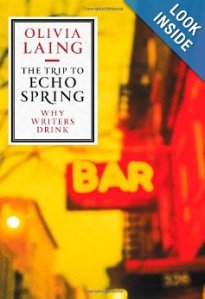Book review: Why writers drink

Because of a logistical slip, this review did not get published in the usual venue… I think it’s well worth a read (as is the book in question), so here it is, below:
Review: The Trip to Echo Spring. Why Writers Drink by Olivia Laing
Canongate, €28.99 (Hardback)
Frieda Klotz
One of the most pervasive and dangerous myths about alcohol is that can be a source of creative inspiration Musicians take drugs, writers like to drink, and popular culture often views their addictions with indulgence. In “The Trip To Echo Spring: Why Writers Drink,” Olivia Laing offers plenty of evidence, if it were needed, to confirm that there’s little to gain from drinking too much – that alcoholism harms oneself and others, including those individuals who happen to be literary stars. It’s good to see the cliché contradicted.
Laing looks at the lives of six American writers (all men) – F. Scott Fitzgerald, Ernest Hemingway, Tennessee Williams, John Berryman, John Cheever and Raymond Carver. Slowly – too slowly at first, but then more persuasively – she pieces together her assessment of how drink filtered into their work.
The term “Echo Spring” comes from a brand of Southern bourbon that appears in Tennessee Williams’ play, “Cat on a Hot Tin Roof.” For Brick, one of the characters, liquor has the capacity (in Laing’s words) “to bring on the click: the moment when all the agitating noise in his head goes blessedly to silence.” “Why does a man drink?” Williams wrote to a friend. “1. He’s scared shitless of something. 2. He can’t face the truth about something.” Similarly, F. Scott Fitzgerald, saw alcohol as a refuge. “Drink is an escape. That is why so many people do it now. There is Weltschmerz – the uncertainty of the world today. All sensitive minds feel it. There is a passing away of the old order and we wonder what there will be for us in the new – if anything.”
Laing does not have much time for justifications but she does want to understand addiction. She attends an AA meeting in New York, where people drift in clutching cups of coffee, and records her own frostiness, “that tiresomely English reluctance to join in.” She notes the vocabulary of alcoholism, common enough to have entered general usage by now – denial, regrouping, projection, dry drunk. As for why some people are so prone to addictions, Laing quotes a study which found that compulsive users of nicotine, drugs and alcohol all reported that they had gone through some trauma during childhood. The study’s author concluded perceptively, “It is difficult to get enough of something that doesn’t quite work.”
In the lives of her six subjects Laing finds plenty of evidence of trauma, ranging from the suicide of a parent to a sexual identity suppressed because of social constraints. Here is a devastating excerpt from a letter Berryman wrote to his mother asking about his father, who had killed himself, trying to make sense of a childhood memory. “Did I hear Daddy threaten to swim out w me (or Bob?) or drown us both? Or did you tell me later? when?”
Just how painful these experiences were is clear. Berryman, who struggled with depression and later also died by suicide, at one point composed a summary of his life, which he read out at a treatment group: “Married present wife 8 yrs ago. Many barbiturates & tranquilizers off & on over the last 10 yrs. Many hospitalizations. Many alibis for drinking, lying abt it. Severe memory-loss, memory distortions. DT’s once in Abbott, lasted hours. Quart of whiskey a day for months in Dublin working hard on a long poem. Dry 4 months 2 years ago. Wife hiding bottles, myself hiding bottles … Lectured too weak to stand, had to sit. Lectured badly prepared… Literary work stalled for months.” And it goes on.
A hazard for people who write about writers is that their own prose can feel dull by comparison with their subjects’. Laing, though, is an accomplished stylist and writes with a real flair. Her casual tone is somewhat misleading. This account is carefully put together, blending literature and biography, personal revelation with analysis. A couple of times, however, she goes over the top, and can then come across as overly emotional, precious or psychoanalytic. A suggestion that a Freudian neurosis between Berryman and his mother could have been at the root of his drinking is particularly unfortunate (and distasteful).
Laing’s own familiarity with the dynamics of alcoholism – the lure and compulsion that underlie it – is evident. She writes that she is aware of “how pleasurable it might be to let alcohol unhinge you, to take you down into an unreachable, sunken place, where sounds are very muted.”
Part way through the book she discloses the source of her fascination. Her parents split up when she was a child, and her mother embarked on a relationship with a woman who happened to be an alcoholic. Laing grew up witnessing arguments between the pair – raised voices over dinner and booze-fuelled spats that continued into the night. The relationship ended although the woman, called Diana, remained a friend of the family. Diana recovered from alcoholism but Laing was left with scars and says she has an “absurdly unrealistic co-dependence that’s had long-reaching consequences in the relationships of my adult life.”
“The Trip to Echo Spring” is structured around a journey, as Laing takes a train ride across America visiting places her subjects lived in and wrote about. Towards the end for her 34th birthday her mother joins her. In a way, this is a story of America as well as its writers; and in its preoccupation with their struggles and with what drove and influenced these men, it is about the literary process too.
Laing has crafted a sensitive, imaginative study that puts firmly to bed the notion that writers, or anyone for that matter, might benefit from excessive drinking: alcohol dulls the alchemy of a writer’s work and has the side effect of ruining their lives. There is always another option, she argues. “At the end of the day … the only thing to do is to take a hold of yourself, to gather up the broken parts. That’s where recovery begins.”

This sounds like a great book. Thank you for the suggestion. You might like to check out the autobiography from Kieran Doherty, Back From The Abyss. http://capandbellspress.com/2013/05/back-from-the-abyss/
If any book has ever given me a true sense of what it means to be an alcoholic, this would be it. Doherty writes with sincerity and his book reads really well. I couldn’t put it down. Some of the situations he lands himself in through excessive drinking are shocking. I highly recommend looking into this book. I think you would appreciate it.
Hi Jack. Many thanks for your comment! I haven’t heard of Kieran Doherty but I will look him up. I really enjoy stories of addiction & recovery. Frieda